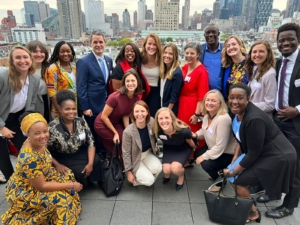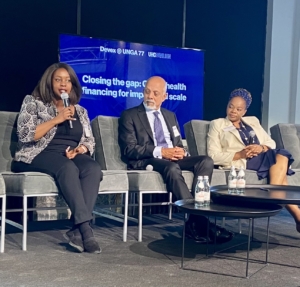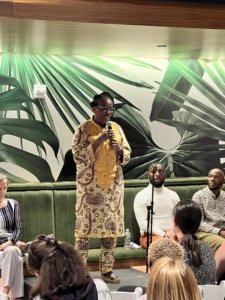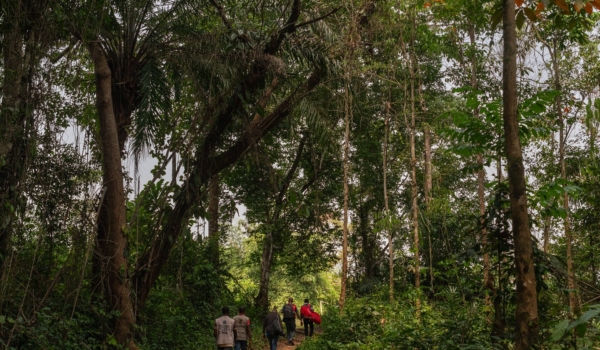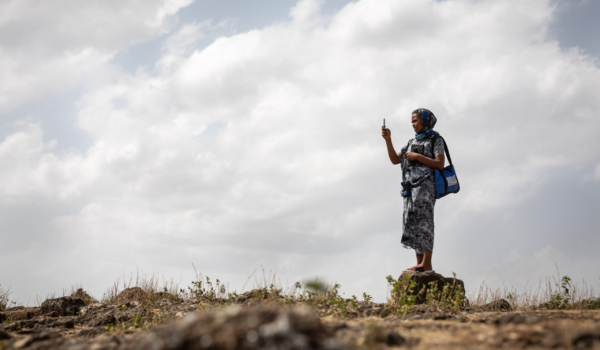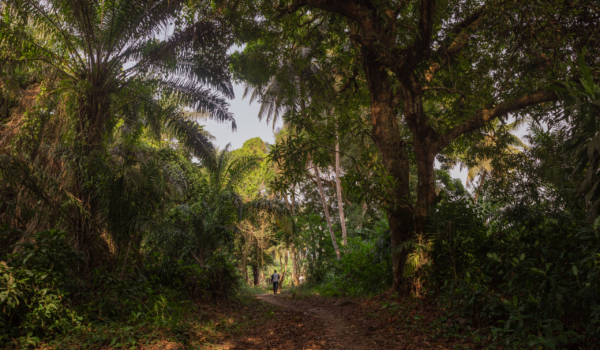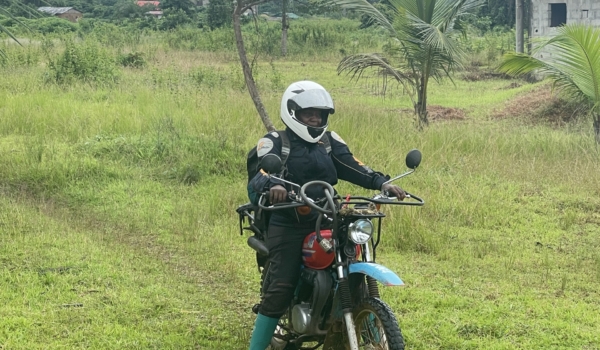In September, global leaders convened in New York, USA for the first in-person meeting of the United Nations General Assembly (UNGA) since the COVID-19 pandemic began. We stood alongside our partners–peer organizations, funders, policymakers, and advisors–to advocate for the prioritization of community health in the pursuit of healthcare for all. As we look forward, four key themes from #UNGA77 resonate with our team–captured in a few of our favorite moments that highlighted their urgency and importance:
1: Community health workers, the majority of whom are women, are overdue for fair, reliable pay.
Throughout the week, community health workers (CHWs), health leaders, and advocates rallied for the recognition of community health workers as a vital part of the health system–and demanded they be paid for their lifesaving work. On September 19, the Community Health Impact Coalition (CHIC) hosted a breakfast briefing to equip policymakers, funders, implementers, advocates, and allies to advocate for professional community health workers. “To be a member of the working poor, to be a CHW, is to be an anonymous donor, a nameless benefactor to everybody else. We look forward to the UNGA when CHWs are no longer the leading philanthropists,” said Dr. Madeleine Ballard, Executive Director of CHIC. And Bupe Sinkala, a community health worker and mentor mother with mothers2mothers in Zambia, said, “CHWs like me need more support urgently. Fair pay, training, recognition–these are the things that motivate us as professionals.”
Across other events, leaders committed to action on paying community health workers–and urged others to do the same. The Clinton Global Initiative’s September 20 plenary highlighted the Africa Frontline First Initiative’s commitment to action for health for all by supporting and paying 200,000 community health workers in Africa. And at the Africa CDC’s event, Director General Dr. Ahmed Ogwell Ouma raised a call to action: “We call upon the public, private, multilateral organizations, and philanthropy to pay community health workers.”
2: Without women, there is no health system. “Health for all” means gender equity for those seeking care–and those providing it.
Recognizing the essential role women play in delivering healthcare at the community level, health leaders and changemaking organizations called for gender parity in community health. On September 13, Last Mile Health, Women in Global Health, Community Health Impact Coalition, and the Government of France co-hosted “From Gender Policy to Gender Parity: Lessons from the Community Health Workforce,” where health leaders, policymakers, and community health workers shared their experiences and lessons learned as they have worked to design and implement gender-transformative health policies and programs. “It is high time to deconstruct gender stereotypes that surround the community care professions and recognize the inestimable contribution of those millions of women,” said Stéphanie Seydoux, France’s Ambassador for Global Health. And Dr. Meseret Zelalem Tadesse, of Ethiopia’s Ministry of Health, said, “There is much more we can do as leaders to recognize health workers for their outstanding service.”
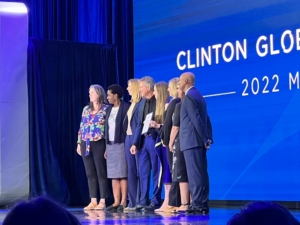
Last Mile Health CEO Lisha McCormick joins Chelsea Clinton onstage at a Clinton Global Initiative plenary
The theme of gender equity in health also featured prominently at events with a focus on financing change. At Goalkeepers 2022, Melinda French Gates highlighted the urgency of unlocking a gender-equal world by growing women’s power: “Real power isn’t just access to a doctor or midwife,” she said. “It’s about the ability to make fundamental choices for your body and health.” And the Clinton Global Initiative’s September 19 plenary featured our commitment to action to improve opportunities for female community health workers: “Last Mile Health will bring urgently needed primary care support to remote communities in Liberia, Ethiopia, and Sierra Leone by training healthcare workers in each,” said Chelsea Clinton, vice chair of the Clinton Foundation. “Their commitment will improve the quality of healthcare for mothers and children, and advance gender equity and equal pay for community health workers, improving equity on multiple dimensions simultaneously.”
3: Strengthening community health programs is an investment in our future–from preventing the next pandemic to addressing climate change. But we can’t achieve this vision without closing the financing gap.
Reflecting on today’s most pressing health crises, leaders in global health drew the connection between community health and these intersectional issues. At CHIC’s briefing, Dr. David Walton, the US Global Malaria Coordinator with the US President’s Malaria Initiative, said, “Pandemic preparedness is a robust cohort of community health workers who are trained, paid, and fully integrated into the health system.” And at a Devex event, Angela Gichaga, CEO of the Financing Alliance for Health, asked, “Where does health stop? Where does climate start? We need to think about complementary investments.” The Global Fund’s Aisling Quirke said, “CHWs are quite simply the first line of defense in our health system. A $4.4 billion financing gap for community health is unacceptable in a world with so much capital.”
In an encouraging step toward addressing the health financing gap, The Global Fund’s replenishment shattered records for the most ever raised by any multilateral health fund: global leaders, advocates, and partners pledged $14.25 billion to fight HIV/AIDS, TB, and malaria, end health inequity, and stop preventable loss of life. “Now is the moment to accelerate our efforts, to reduce health inequities, to reduce barriers to access–including gender and human rights barriers–and to build more inclusive health care systems to leave no one behind,” said US President Joe Biden.
4: The global health field must prioritize African-driven priorities–and African-driven solutions.
To build strong, effective, and equitable health systems, we must ensure programs and policies are shaped by those closest to the work: African health leaders and health workers. Yvonne Aki-Sawyerr, Mayor of Freetown, Sierra Leone, reminded us that the global health field must prioritize African-driven priorities and African-driven solutions: “The key to addressing global development challenges such as gender equality and climate change starts with implementing local solutions,” she said during the Goalkeepers 2022 event. “Nothing for us without us.”
Throughout UNGA week, African health leaders and health workers also shared key messages about their lessons learned caring for patients and addressing their communities’ and nations’ most pressing health challenges. “The point of care is not just doing the delivery. It’s the relationship. You empower them to take care of themselves, take care of others,” said Marion Subah, Last Mile Health’s Liberia Country Director, speaking about her experiences as a nurse and midwife in Liberia during an event hosted by Johnson & Johnson Global Health. Dr. Lia Tadesse, Ethiopia’s Minister of Health, elevated the urgent need for prioritizing community health: “Despite great progress, approximately 20% of TB cases in Ethiopia still go undetected. Community-based detection plays a critical role in connecting patients to care.” Ellen Johnson Sirleaf, former President of Liberia, called for gender equity: “Give women and girls the leadership opportunities they deserve and let them take charge of building a fair and equal future.” Liberian community health worker Ruth David, speaking at the Last Mile Health, CHIC, and Women in Global Health side event, emphasized the need for a larger community health workforce: “I am requesting that the numbers of community health workers increase in Liberia and around the world.”
Although much remains to be done, this year’s General Assembly has left us inspired by the movement to realize the right to health. Today and always, we believe we can and must make universal health coverage a reality–and that paid, professional community health workers are the key to achieving it. Onward!

